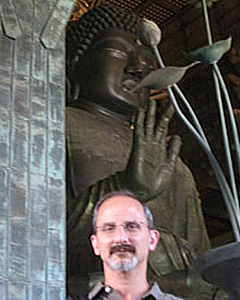Looking East
UMBC’s new Asian studies program will give students the opportunity to learn about Asian languages, cultures and the significant impacts that the region is having on the world. The first public institution in Maryland with an Asian studies degree, UMBC offers a major, a minor and a certificate.
Constantine Vaporis, professor of history and the director of the new program, has been advocating for an Asian studies program on campus for many years. Recently, the right conditions—a cohort of faculty members with expertise in Asia and an increasing focus on making UMBC into a global campus—have come together to bring his dream to fruition.
As the economies and global influence of Asian nations continue to grow, both students and educators are realizing that knowledge of the region can give graduates an advantage as they begin their careers. The program aims to prepare students for various professional paths related to Asia, such as advanced academic research, international relations, international business and trade, governmental service and international law.
Noting the number of Asia-focused classes and events already happening on campus, Vaporis said that “the program will coordinate all of the things that are already going on as well as encourage new ones, and be a voice and organizing mechanism for those elements.”
The program’s value as an organizing mechanism was made clear in the days after the devastating earthquake that hit Japan on March 11. The Asian studies program was able to serve as a central coordinator for relief efforts, working with other departments to quickly organize a lecture, concert and (with the help of the Japanese Culture Club) two fundraisers.
A new course, “Asia 100,” will introduce students to the program. Taught by Vaporis, the course will also draw on participating faculty to show the different approaches to the area of study. Departments that may intersect with the program include history, economics, music, modern languages and linguistics and American studies, and potential courses that can be taught through the new program range from a philosophy course called “The Philosophy of Asian Martial Arts” to a political science course teaching “International Relations of the Asia-Pacific Region.” UMBC is also the only public university in Maryland to teach the three major East Asian languages: Chinese, Korean and Japanese.
Vaporis said that having the program on campus will open up future opportunities. For example, faculty members will have access to resources to help them create courses for the program. “We’ll be able to host faculty development workshops to infuse Asia in the curriculum for people who have the interest but maybe not the expertise,” Vaporis said.
The program will also bring speakers to campus and, Vaporis hopes, expand study abroad opportunities in Asian countries.
(5/12/11)

